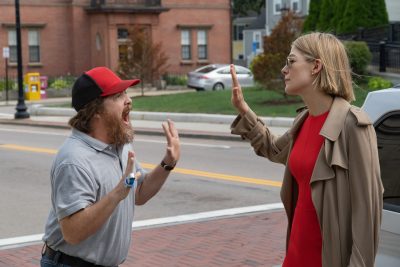“I Care a Lot”(2020 production, 2021 release). Cast: Rosamund Pike, Peter Dinklage, Dianne Wiest, Eliza González, Chris Messina, Isiah Whitlock Jr., Macon Blair, Alicia Witt, Damian Young, Nicholas Logan. Director: J Blakeson. Screenplay: J Blakeson. Web site. Trailer.

Inflicting cruel intentions on others is a truly despicable act. But, as appalling as that is, it’s even worse when they’re camouflaged in what appears to be heartfelt, altruistic sincerity. The malice permeating such circumstances is staggering, leading to an array of indignities. Of course, such scenarios can also sow the seeds of retribution against the perpetrators, as an unscrupulous business owner discovers for herself in the bitingly cynical new dark comedy, “I Care a Lot.”
Marla Grayson (Rosamund Pike) has got quite a sweet deal going for herself. As the owner of a legal guardianship agency, she assumes legal responsibility for the care of seniors who are unable to attend to their own needs, many of whom are afflicted with various forms of dementia and memory disorders. In many of those cases, the patients either have no families to provide care or their relatives are judged unsuitable in one way or another (negligent, abusive, disinterested, etc.). And Marla’s apparent sense of compassion is so seemingly heartfelt that she never has any trouble convincing courts to rule in her favor when it comes to awarding guardianship in these situations, particularly before an especially sympathetic justice, Judge Lomax (Isiah Whitlock Jr.). It all appears perfectly legitimate and above board. There’s just one catch: It’s all a well-orchestrated scam.
With the help of her partner in life (and partner in crime), Fran (Eliza Gonzalez), Marla has got her scheme down to a science. She identifies prospective “clients” with the aid of Dr. Karen Amos (Alicia Witt), a shady medical practitioner who supplies Marla with leads on patients who are easily railroaded into being declared unfit to maintain their independence, often in “emergency” court proceedings at which the individuals in question aren’t even present. Some of these patients truly suffer from various forms of impairment, but others are only marginally incapacitated at best. Marla’s new clients are then involuntarily transferred from their homes to a senior living residence managed by Sam Rice (Damian Young), who willingly complies with all of Marla’s requirements regarding medication, housing, access to outsiders and all other forms of care, all without any say by the patients or their kindreds. Marla’s plan generally isolates her clients so thoroughly that almost no one has any contact with them, and they, in turn, are unable to reach out to the outside world. And, as outrageous as that might seem, it’s all perfectly legal.
With her clients isolated, that leaves Marla free to do as she will when it comes to the management of their lives, most notably their assets – bank accounts, investments, property and so forth. Given her legal control over these items, she’s free to do whatever she wants with them. This usually involves their liquidation, with most of the proceeds going into her own pocket. She justifies this practice by claiming that the funds generated from such sell-offs and close-outs are necessary to cover her organization’s operating expenses. She gets away with it with relative ease, too. And, if a problem arises, she merely takes it before Judge Lomax, who nearly always rubber-stamps her requests. This becomes apparent, for example, in a case involving Mr. Feldstrom (Macon Blair), who is legally prevented from seeing his mother, based on trumped-up claims that his visits seriously upset her, a problem that Marla convincingly portrays as not being in her client’s best interests. Her slimy but well-rehearsed sincerity routine is so thoroughly persuasive that Judge Lomax can’t help but concur, an outcome that plays out over and over again in countless proceedings.

When one of Marla’s clients passes away unexpectedly – with the fleecing process still incomplete, an “investment” that doesn’t reach its full payoff potential – Sam advises her that there’s an opening in his facility for a new patient. This prompts Marla to visit Dr. Amos in search of a new client recommendation. Having helped out Marla many times in the past, Dr. Amos says she may have a prospect but adds that she wants a piece of the action this time, primarily because the individual in question is a “cherry” ripe for the picking. The mark is Jennifer Peterson (Dianne Wiest), a recently retired financial professional who has amassed more than a small fortune over the years, has begun showing modest signs of memory loss and has absolutely no known family members. She’s the kind of prospect for whom a plea for an emergency proceeding can easily be filed and, thanks to Judge Lomax’s dimwitted naiveté, is almost guaranteed to result in a ruling in Marla’s favor.
Before anyone knows it, Marla’s plan to rope Jennifer is a done deal. Needless to say, Jennifer is stunned and bewildered by what’s happening around her. She quickly finds herself whisked away from her beautifully appointed home and resettled in a comfortable but small two-room unit at Sam’s facility. Her cell phone is confiscated, and she’s confined in what amounts to a heavily secured institution that allows her no access to the outside world. She’s anxious to protest her conditions, but, given that Marla has given orders that she be heavily sedated, it’s unclear how seriously any such complaint might be taken.

From Marla’s perspective, everything seems to be going according to plan. However, before long, an unexpected hiccup emerges. While Fran is busy preparing Jennifer’s home for sale, she receives a visit from a cab driver (Nicholas Logan) seeking to pick up Jennifer for what appears to be a regular, previously scheduled ride. When Fran explains to the driver that Jennifer no longer lives there, he leaves somewhat surprised – and scared. Fran’s not sure what to make of it, but, when she explains the situation to Marla, she seems unfazed. It’s a position she seriously might want to reconsider.
In short order, Marla receives a visit at her office from lawyer Dean Ericson (Chris Messina), an oily shark of an attorney who claims to represent individuals interested in the welfare of Ms. Peterson. His lack of specificity leaves Marla unimpressed, prompting him to propose various forms of settlement, all of which she rejects, suspecting she can get more out of him than what he is offering. Ericson’s tone soon changes, moving from talks of compromise to less-than-veiled threats, contending that he’s associated with powerful individuals who care greatly about Jennifer’s well-being and who could inflict tremendous harm if their wishes are not complied with. No matter what he says, however, she repeatedly rebuffs his claims, essentially telling him to take a hike.
Little does Marla know that she’s embarked on quite a perilous course. This is confirmed when she pays a visit to Jennifer, who, with a sinister laugh and smug smile, tells Marla that she’s “in trouble now.” As it turns out, Marla is unaware that her client truly does have powerful contacts in her corner, most of them members of the Russian mob, most notably Roman Lunyov (Peter Dinklage), a truly bad dude. He’s so ruthless, in fact, that he gravely intimidates his attorney, Mr. Ericson, and his chief muscle, Alexi Ignatyev, the purported cab driver who reluctantly and sheepishly had to report Jennifer’s mysterious absence to his now-furious boss. In light of Jennifer’s disappearance, Roman begins turning up the heat to find out what happened to her, an effort that places Marla and her cohorts in extreme danger. It sets up a scenario where a slick con artist is now faced with matching wits with a truly evil crime figure. And it’s a conflict that is bound to get exceedingly nasty, full of unexpected twists and turns, before anything is resolved – if that’s even possible at this point.

When we intentionally seek to deceive others, we’re playing with fire. Such acts, backed by nefarious motives, are time bombs waiting to go off – maybe not in the short term and perhaps not all at once, but certainly at some point. Some might call this karma or just deserts, and those designations are certainly fine. However, more precisely, they’re purposely created acts based on one’s beliefs, the stuff of the conscious creation process, the philosophy that maintains we draw upon these intangible resources in manifesting the reality we experience. And, when we load the dice of our beliefs with a toxic mix of intentions, the concoction is quite volatile, just waiting to explode with vile repercussions when the time is right, as Marla and company are about to find out.
Hatching a scheme like the one Marla has cooked up involves purposely formulating beliefs aimed at inflicting harm on others. She willingly seeks to bring about circumstances that fulfill this objective. What’s perhaps most egregious about this is that she knows what she’s doing and then intentionally does it, compounding those acts by lying to others with a phony smile that’s often erroneously interpreted as wholly sincere. And, if anyone dares question her earnestness, she’s prepared for that, too, by manifesting contingencies to cover her behind and make the pleadings of any claimants look foolish, as seen in her dealings with Mr. Feldstrom.
In a perverted sort of way, one could say that Marla’s plan is one of sheer genius in the way she has skillfully manipulated matters to her advantage. It shows tremendous dexterity in the way she has learned how to overcome the limitations that might restrain the more ethically minded among us in bringing about the results she seeks. In fact, on a purely theoretical level, some conscious creation practitioners might even be in awe of how nimbly she pulls it all together.

But, such cleverness and proficiency aside, this scenario is fraught with all manner of moral issues, which, like everything else one creates, stem from the beliefs we put into their manifestation. And there are some real doozies at work here, the consequences of which Marla can’t be oblivious to. That’s what accounts for her efforts in creating the contingencies she has materialized, stopgap measures aimed at protecting her interests should the need arise.
However, even with her keen sense of being able to envision all of the situations for which such contingencies might be required, can Marla realistically prepare for them all? That’s especially true when it comes to those circumstances where the underlying moral issues of her scam come racing to the surface, sleeping giants that unexpectedly jump up and surprise her like a jack-in-the-box clown. It’s under conditions like that when the scam is susceptible to come crashing down, as Marla discovers in her dealings with Jennifer’s powerful associates.
No matter how creative we might be in coming up with plans to fulfill our goals, we must be cognizant of all of the beliefs that go into their making. If we only pay attention to those that we assume will work to our benefit without giving due consideration to those that could work against us despite their undeniable presence, we place ourselves in serious jeopardy, for those unappealing intentions will make their influence known at some point. And that’s simply due to their inclusion in the belief mix that brought about such scenarios in the first place, no matter how much we might try to disavow them or hope they fail to materialize.
This, of course, raises the question, “Can someone like Marla really get away with something like this?” Well, much rests with how thoroughly she manifests her protective contingencies. But success or failure also depends on how skillful her opponents are in developing effective counter-measures. And, based on what Mr. Lunyov appears capable of, Marla is about to have her hands full.

Perhaps the most important lesson to consider in all this is the consequences that accompany predatory behavior, which has been allowed to run rampant here. In a voice-over at the film’s opening, Marla waxes philosophically about this notion, and she unabashedly admits to being like a lioness that is determined to relentlessly hunt down her prey. That kind of determination and self-confidence have obviously played huge roles in her heretofore success, illustrative of her core capabilities as an expert conscious creator. However, given the powerful ethical issues that permeate such practices here, can she sustain that success indefinitely?
In a sense, Marla’s story becomes a metaphor for the practice of predatory capitalism. It’s a scathing indictment of a system that puts profits and self-interest before people, one in which the game is rigged from the outset and most of the players have absolutely no say in their participation. What’s more, this metaphor operates in this film on several levels. First there’s the individual scale, as evidenced by the indignities that Marla thrusts upon Jennifer. But then there’s also the global scale, as symbolized by the parties involved in this dispute – an American businesswoman doing battle with a Russian mobster. The symbolism behind this conflict speaks volumes about the sheer scope of this practice as it’s applied on a worldwide scale, a truly scary and infuriating prospect. That’s especially apparent when the resolution of their combat is revealed, providing a chilling reflection of what’s really going on in the wider world.

From this standpoint, one might arguably view the situation as hopeless. In fact, that’s one of the reasons why this film has come under ridicule by some viewers and critics. They’re unable to sympathize with either of the combatants, and they lament that there’s no way for those who have been dealt out of the game to get back in. But, in creating our existence, there are always infinite possibilities to choose from as long as we’re able and willing to envision their realization. That, in itself, should give us hope, to provide us with the inspiration to devise ways of overcoming such seemingly intractable conditions. And, if we can do that, then maybe – just maybe – the predatory capitalists won’t be able to get away with it after all.
Seeing the ugly truth exposed in all its vile splendor may be unpleasant, hurtful and shocking, but sometimes it’s a necessary wake-up call for the betterment of our collective well-being, as this cynical, darkly satirical comedy and social commentary illustrates, especially with regard to the nature of predatory capitalism. While the film admittedly goes off the rails at times in its second half, its wickedly biting humor makes clear the ruthlessness inherent in the practices of this economic system, both on a personal and a global geopolitical scale. What makes the film, though, are its superb performances, especially those of Wiest, Dinklage, and, especially, Golden Globe Award winner Pike, who delivers a riveting portrayal throughout. Some may find the content and message of this offering rather troubling, but that’s simply the movie doing its job: It stresses the need for us to shed our Pollyanna attitudes, no matter how disillusioning that might be, and open our eyes. Indeed, it reminds us of the old adage that it’s easier to fool people than to convince them that they’ve been fooled. The film is available for online streaming.
We’re no doubt aware that it’s possible to fool some of the people all of the time and all of the people some of the time but not all of the people all of the time. Nevertheless, the perpetrators in this story don’t seem to buy into that notion, a view they maintain at their peril, especially when confronted by equally adept crime figures (not to mention a mountain of karma). And, when up against such circumstances, it doesn’t matter how much one might claim to care.
Copyright © 2021, by Brent Marchant. All rights reserved.

No comments:
Post a Comment